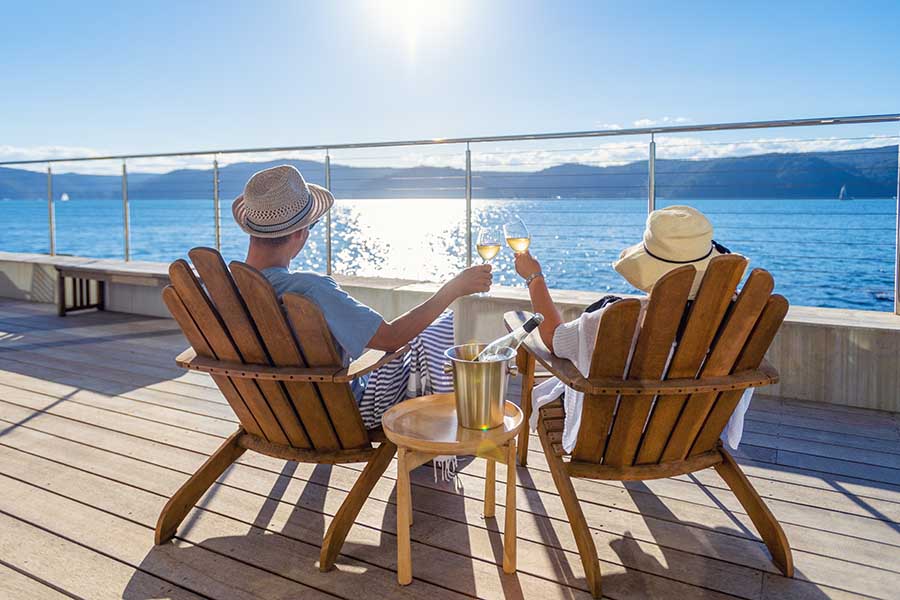Can You Really Live on a Cruise?

Living on a cruise is a life many people only dream of: Unlimited time aboard an ocean liner with all the amenities of a luxury hotel—gourmet restaurants, wellness center, swimming pools—traveling to desirable destinations and some of the most remote places on earth.
For some, this is a substantial part of their lifestyle as owners in so-called residential ships, a niche yet growing sector in travel that includes ships with fanciful names such as The World, MV Narrative, and Villa Vie Odyssey. These may look like typical cruise vessels, but they feature key differences: They aren't open to the public—individuals must own a unit to gain access; they offer spacious multiroom apartments, not cabins, limiting the number of people on board; and they set their own itineraries, which vary from year to year and can include typically hard-to-reach parts of the world like Antarctica, Easter Island, and the Galapagos archipelago. In addition to dining and recreational facilities, these ships often include cultural programming such as expert lectures and guided expeditions in ports of call.
It's enough to make travel enthusiasts want to give up life on land. While it could be an interesting lifestyle, particularly for affluent retirees, what are the real-life implications of making such a move? Here are some of the considerations.
Understand the financial trade-offs
It's easy to get lost in the dream of living on a cruise, but like with any investment, you have to consider its impact on your finances and cash flow management.
Unlike a vacation home, which you can eventually turn into your permanent home, rent out to help defray expenses, or sell if necessary, a residence on a ship doesn't offer that flexibility. The World, Residences at Sea, for example, doesn't allow owners to make their ship their primary home. Nor can they rent their units—which range in price from $2.5 million to more than $15 million, plus annual dues of 8% to 10% of the unit's value—to non-owners. Even sales are restricted to a private waitlist composed of existing owners or personally referred prospects. These restrictions may favor the exclusivity and privacy sought by its residents, but if your financial situation suddenly changes, it could be difficult to quickly offload this type of asset.
Another factor is the ownership structure. On some ships like The World, owners technically gain shares of the ship's holding company proportionate to their unit's square footage, while other vessels, like the MV Narrative launching in 2027, offer termed lease agreements for exclusive occupancy. So one question you should consider is, "Does the asset appreciate?" And if you decide to lease instead of own, is the experience worth enough to you to sacrifice the return those funds could generate invested elsewhere?
Prepare for the worst
The seclusion of life at sea may be attractive, but it's also a drawback. No ship, no matter the size or cost, can provide comprehensive medical treatment should you have a health emergency resulting from illness or injury. That's why you should consider your health situation and have a plan for the worst-case scenario at sea.
Chief considerations include your ability to reach a hospital, healthcare insurance coverage abroad, and whether a ship's crew and facilities can sustain you until that happens. Everyone has different thresholds for risk, but make sure you understand the access to medical care you'll have while on board.
Regardless of your health, it's wise to update your estate plan and insurance policies before embarking on any extended journey. And don't overlook your home back on land. If you'll be away at sea for an extended period, ensure that your property and casualty insurance is up to date.
How long will you enjoy it?
It's safe to say that living on a ship may not be for everyone. However, even globetrotters and adventure seekers may eventually wish for a change of scenery.
This type of experience could lose its luster for a number of reasons, whether it's changing medical needs, monotony, isolation, or even the inability to develop friendships in such a small community. So, while this is a unique and rewarding lifestyle, it may be a good idea to think of it more as an extended vacation or a second home.